U.S. Treasuries Hit Hard, Can the Stock Market Rally Continue?
Stock-Markets / Financial Markets 2010 Feb 13, 2010 - 05:18 AM GMT Justice Isn’t Blind, It’s Unconscious -
(Bloomberg) It is so widely accepted that Lehman Brothers Holdings Inc.’s balance sheet was bogus that even former Treasury Secretary Hank Paulson can say it in his new memoir. And still, the government hasn’t found anyone who did anything wrong at the failed investment bank.
Justice Isn’t Blind, It’s Unconscious -
(Bloomberg) It is so widely accepted that Lehman Brothers Holdings Inc.’s balance sheet was bogus that even former Treasury Secretary Hank Paulson can say it in his new memoir. And still, the government hasn’t found anyone who did anything wrong at the failed investment bank.
How could that be, 17 months after Lehman collapsed and sent the global credit crisis into overdrive? While Congress and the White House dither about reforming the U.S. financial system, the wheels of justice are grinding so slowly, if at all, that it seems there’s no appetite in Washington for holding Wall Street executives accountable for anything.
Jobless Suffer as Corporate Cash Hits $1.18 Trillion.
(Bloomberg) A majority of companies in the Standard & Poor’s 500 stock index increased cash to a combined $1.18 trillion while simultaneously reducing spending, keeping a jobs recovery on hold.
Investment and hiring may remain low as companies bring unused capacity back on line and rely on productivity gains to fill demand, said Edward Lazear, former economic adviser to President George W. Bush and a professor at Stanford University in Stanford, California. Employers have eliminated 8.4 million jobs since the U.S. slipped into recession in December 2007.
“About three years into the recovery, you start getting significant wage growth,” Lazear said in an interview. “It’s unfortunate because it means workers suffer for a pretty long time after the recovery takes off.”
Can the rally continue?
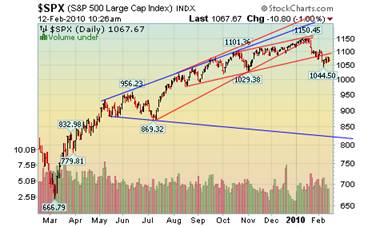 -- Seasonally, the period between mid-February and late March is a very weak time for stocks. There are two features of the market that exposes its vulnerability. The first is excess inventories. Any contraction in consumption will cause manufacturers to cut costs (payroll) even more. The second is that speculators have taken on more debt against their positions. It may take only a 2-3% decline to force new selling via margin calls.
-- Seasonally, the period between mid-February and late March is a very weak time for stocks. There are two features of the market that exposes its vulnerability. The first is excess inventories. Any contraction in consumption will cause manufacturers to cut costs (payroll) even more. The second is that speculators have taken on more debt against their positions. It may take only a 2-3% decline to force new selling via margin calls.
Treasuries took a hit this week.
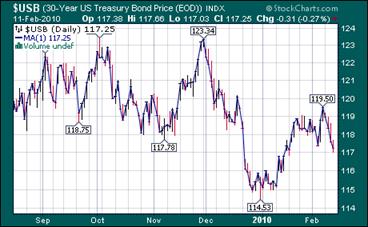 -- Treasuries climbed, with 10-year notes gaining for the first time in four days, on concern China’s economy will slow and threaten the global recovery after the nation ordered banks to set aside more deposits as reserves. Yields on notes and bonds dropped as the People’s Bank of China said reserve requirements will increase 50 basis points on Feb. 25, and investors speculated European Union efforts to help Greece tackle its budget deficit may prove insufficient. A government report showed U.S. retail sales increased in January more than forecast.
-- Treasuries climbed, with 10-year notes gaining for the first time in four days, on concern China’s economy will slow and threaten the global recovery after the nation ordered banks to set aside more deposits as reserves. Yields on notes and bonds dropped as the People’s Bank of China said reserve requirements will increase 50 basis points on Feb. 25, and investors speculated European Union efforts to help Greece tackle its budget deficit may prove insufficient. A government report showed U.S. retail sales increased in January more than forecast.
Gold tries to rally, but cannot regain higher ground.
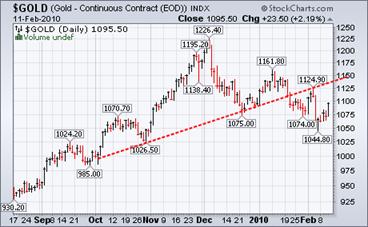 -- Gold fell in New York as the dollar strengthened, diminishing the appeal of the metal as an alternative asset, as China moved to cool growth in the world’s fastest-growing major economy. “Gold is reacting to liquidity constraints implemented by the People’s Bank of China and a further strengthening of the dollar,” said Bayram Dincer, a commodity analyst at LGT Capital Management in Pfaeffikon, Switzerland.
-- Gold fell in New York as the dollar strengthened, diminishing the appeal of the metal as an alternative asset, as China moved to cool growth in the world’s fastest-growing major economy. “Gold is reacting to liquidity constraints implemented by the People’s Bank of China and a further strengthening of the dollar,” said Bayram Dincer, a commodity analyst at LGT Capital Management in Pfaeffikon, Switzerland.
The Nikkei shows continued weakness.
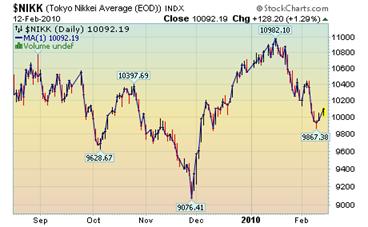 -- Japan’s economy probably grew at the fastest pace since the first quarter of 2008 as a global trade revival fueled demand for the nation’s exports. Gross domestic product rose an annualized 3.6 percent in the three months ended Dec. 31, following a 1.3 percent expansion in the third quarter, according to the median forecast of 23 economists surveyed by Bloomberg News. But will this help the Nikkei?
-- Japan’s economy probably grew at the fastest pace since the first quarter of 2008 as a global trade revival fueled demand for the nation’s exports. Gross domestic product rose an annualized 3.6 percent in the three months ended Dec. 31, following a 1.3 percent expansion in the third quarter, according to the median forecast of 23 economists surveyed by Bloomberg News. But will this help the Nikkei?
Shanghai orders banks to carry more cash.
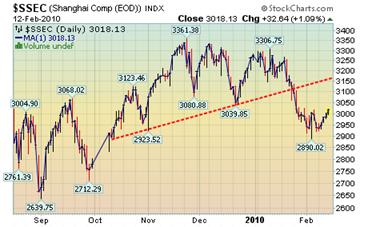
-- China stocks trading in the U.S. fell the most in more than a week after the nation ordered banks to set aside more deposits as reserves for the second time in a month to cool the world’s fastest-growing economy. Bank and property stocks are thought to be the most affected by the higher bank reserve requirement, set to take effect on February 25th. More weakness ahead?
The Greek “non-solution” makes the U.S. dollar look good.
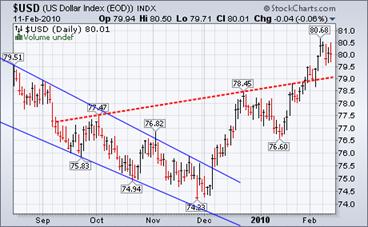 The dollar may be able to rally further based on the weakness of the Greek rescue plan. The plan looks “strangely thin, raising suspicions that Germany, Holland and the creditor states of Northern Europe still cannot agree on the terms of any bail-out.” The fact is, the European leaders are just trying to buy time without offering any substance since their own economies are already hard-pressed with economic woes.
The dollar may be able to rally further based on the weakness of the Greek rescue plan. The plan looks “strangely thin, raising suspicions that Germany, Holland and the creditor states of Northern Europe still cannot agree on the terms of any bail-out.” The fact is, the European leaders are just trying to buy time without offering any substance since their own economies are already hard-pressed with economic woes.
Big promises…small results.
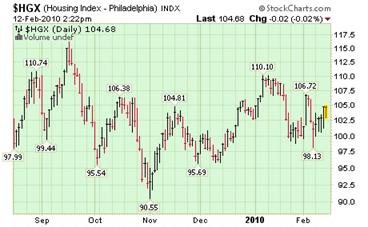 -- The Obama administration’s $300 billion Hope for Homeowners program may be retooled to help the growing number of Americans who owe more than their properties are worth as current anti-foreclosure efforts fail to account for these “underwater” borrowers. The changes would be at least the third lease on life for the program, which began in October 2008 during the Bush administration and has so far helped just 96 of the 400,000 homeowners originally targeted.
-- The Obama administration’s $300 billion Hope for Homeowners program may be retooled to help the growing number of Americans who owe more than their properties are worth as current anti-foreclosure efforts fail to account for these “underwater” borrowers. The changes would be at least the third lease on life for the program, which began in October 2008 during the Bush administration and has so far helped just 96 of the 400,000 homeowners originally targeted.
Gasoline prices may be ready for a larger decline.
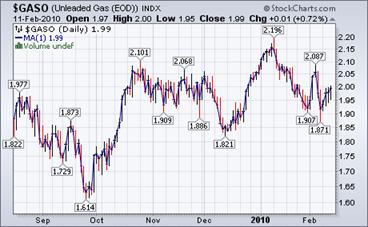 The Energy Information Agency weekly report suggests, “For the third week in a row, the U.S. average price for regular gasoline declined. Settling at $2.66 per gallon, the average fell more than four cents but was $0.77 above last year. On the East Coast, the price slipped almost four cents to $2.69 per gallon. The average in the Midwest dropped the most of any region, tumbling six cents to $2.56 per gallon.”
The Energy Information Agency weekly report suggests, “For the third week in a row, the U.S. average price for regular gasoline declined. Settling at $2.66 per gallon, the average fell more than four cents but was $0.77 above last year. On the East Coast, the price slipped almost four cents to $2.69 per gallon. The average in the Midwest dropped the most of any region, tumbling six cents to $2.56 per gallon.”
NatGas prices still feeling the winter effect.
 The Energy Information Agency’s Natural Gas Weekly Update reports, “Since last Wednesday, January 27, natural gas spot prices posted relatively modest increases at most market locations amid continued cold temperatures. Cold winter temperatures throughout most of the lower 48 States and rising crude oil prices likely contributed to rising natural gas prices.”
The Energy Information Agency’s Natural Gas Weekly Update reports, “Since last Wednesday, January 27, natural gas spot prices posted relatively modest increases at most market locations amid continued cold temperatures. Cold winter temperatures throughout most of the lower 48 States and rising crude oil prices likely contributed to rising natural gas prices.”
How Goldman Sachs Helped Greece to Mask its True Debt.
Goldman Sachs helped the Greek government to mask the true extent of its deficit with the help of a derivatives deal that legally circumvented the EU Maastricht deficit rules. At some point the so-called cross currency swaps will mature, and swell the country's already bloated deficit.
Greeks aren't very welcome in the Rue Alphones Weicker in Luxembourg. It's home to Eurostat, the European Union's statistical office. The number crunchers there are deeply annoyed with Athens. Investigative reports state that important data "cannot be confirmed" or has been requested but "not received."
Which Country’s Debts are Truly the Worst?
Last year, the US dollar was the butt of monetary jokes. In fact, some suggested it was worth as much as toilet paper. With trillion dollar deficits and 0% interest rates, those with common sense looked to other currencies for capital preservation.
In a moment of cosmic irony, some global investors are now fleeing to the safety of the US dollar. Headlines about Greece possibly defaulting on their debt has investors wondering which is truly the worst of all possible worlds? You might be surprised. (Click here for the full article)
Traders alert: The Practical Investor is currently offering the daily Inner Circle Newsletter to new subscribers. Contact us at tpi@thepracticalinvestor.com for a free sample newsletter and subscription information.
Our Investment Advisor Registration is on the Web
We are in the process of updating our website at www.thepracticalinvestor.com to have more information on our services. Log on and click on Advisor Registration to get more details.
If you are a client or wish to become one, please make an appointment to discuss our investment strategies by calling Connie or Tony at (517) 699-1554, ext 10 or 11. Or e-mail us at tpi@thepracticalinvestor.com .
Anthony M. Cherniawski,
President and CIO
http://www.thepracticalinvestor.com
As a State Registered Investment Advisor, The Practical Investor (TPI) manages private client investment portfolios using a proprietary investment strategy created by Chief Investment Officer Tony Cherniawski. Throughout 2000-01, when many investors felt the pain of double digit market losses, TPI successfully navigated the choppy investment waters, creating a profit for our private investment clients. With a focus on preserving assets and capitalizing on opportunities, TPI clients benefited greatly from the TPI strategies, allowing them to stay on track with their life goals
Disclaimer: The content in this article is written for educational and informational purposes only. There is no offer or recommendation to buy or sell any security and no information contained here should be interpreted or construed as investment advice. Do you own due diligence as the information in this article is the opinion of Anthony M. Cherniawski and subject to change without notice.
Anthony M. Cherniawski Archive |
© 2005-2022 http://www.MarketOracle.co.uk - The Market Oracle is a FREE Daily Financial Markets Analysis & Forecasting online publication.



